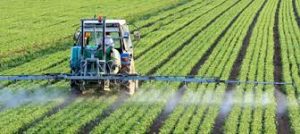23
Jan
Acute Pesticide Incidents May Lead to Loss of Smell
 (Beyond Pesticides, January, 23, 2019) Individuals that have been acutely poisoned by pesticides at some time in their life may be more likely to lose their sense of smell, according to a recent study published in Environmental Health Perspectives. Researchers focused on the effect of high pesticide exposure events (HPEE), such as a pesticide spill or other incident, on a farmers’ ability to smell later in life. This is the first study to indicate pesticide exposure may result in olfactory impairment.
(Beyond Pesticides, January, 23, 2019) Individuals that have been acutely poisoned by pesticides at some time in their life may be more likely to lose their sense of smell, according to a recent study published in Environmental Health Perspectives. Researchers focused on the effect of high pesticide exposure events (HPEE), such as a pesticide spill or other incident, on a farmers’ ability to smell later in life. This is the first study to indicate pesticide exposure may result in olfactory impairment.
Farmers from Iowa and North Carolina enrolled in an ongoing U.S. Agricultural Health Study have been asked about their pesticide use roughly every 5 to 6 years since 1993. In the most recent survey, taken from 2013-2015, farmers were asked additional questions about HPEE in their lifetime and whether they had a significantly decreased or impaired sense of smell.
“Studying farmers gives us more reliable data on pesticide exposures than if we had studied the general population,” says Honglei Chen, MD, PhD, lead author and professor of epidemiology at Michigan State University in a press release. “Because they use pesticides more and it’s part of their job, they’re more likely to remember what pesticides they used and in cases of high exposures, report the specific events.”
Of the roughly 10k farmers interviewed during the recent survey, nearly 1,200 reported some form of impairment to their sense of smell. Analyzing data from questions asked during the original 1993 survey, researchers found that farmers that reported a history of HPEE at the outset were 49% more likely to experience olfactory impairment than farmers that did not.
Evidently, those that delayed washing with soap and water after their exposure incident were roughly 1.5 times likelier to experience loss of smell than those that immediately worked to wash off the pesticide. But scientists found that the route of exposure mattered little, with farmers reporting roughly the same loss of smell whether the HPEE involved either internal or dermal impacts. Significant associations were also found for particular pesticides. Specifically, two legacy organochlorine insecticides, DDT and lindane, as well as the herbicides alachlor, metolachlor, 2,4-D, and pendimethalin were all singled out within the study.
Scientists speculated on a range of ways pesticides may be disrupting olfactory senses. Exposure may damage the epithelium, or thin tissue inside the nose, impair the olfactory nerve, disrupt the immune system, the microbiome within the nose, and/or cause potentially persistent inflammation.
But very few major studies have been performed on the link between pesticide exposures and smell steadfastness. There is incidence in the literature of anosmia, or smell loss, after exposure to a pyrethrin based insecticide, and a 2015 study on farmworker smell difficulties found suggestive but inconclusive results. The authors indicate that although their results were strong, additional research on this issue is necessary to better understand the connection. In any case, it is another consideration for farmers working in chemical-intensive agriculture, alongside reports of increased rates of depression, asthma, and certain cancers.
“Olfactory impairment affects up to 25 percent of our older population, and our understanding of what the consequences are is still very limited,” Dr. Chen noted. “Studies have also suggested that older adults with a poor sense of smell are more likely to die earlier, so understanding the factors involved is very important.”
Farmers and residents alike should work to avoid any HPEE by forgoing the purchase, storage and use of toxic synthetic pesticides in the first place. By transitioning away from toxic chemicals in favor of alternative practices that work with, rather than against nature, farmers, farmworkers, consumers, and the planet will benefit from better health and long-term well-being. Organic represents the realization of this sustainable, alternative paradigm. By purchasing organic whenever possible, you support a system replaces toxic pesticides with safer practices.
Read more about the health effects linked to pesticide exposure through Beyond Pesticides’ Pesticide Induced Diseases Database.
All unattributed positions and opinions in this piece are those of Beyond Pesticides.
Source: MSU Press Release, Environmental Health Perspectives










